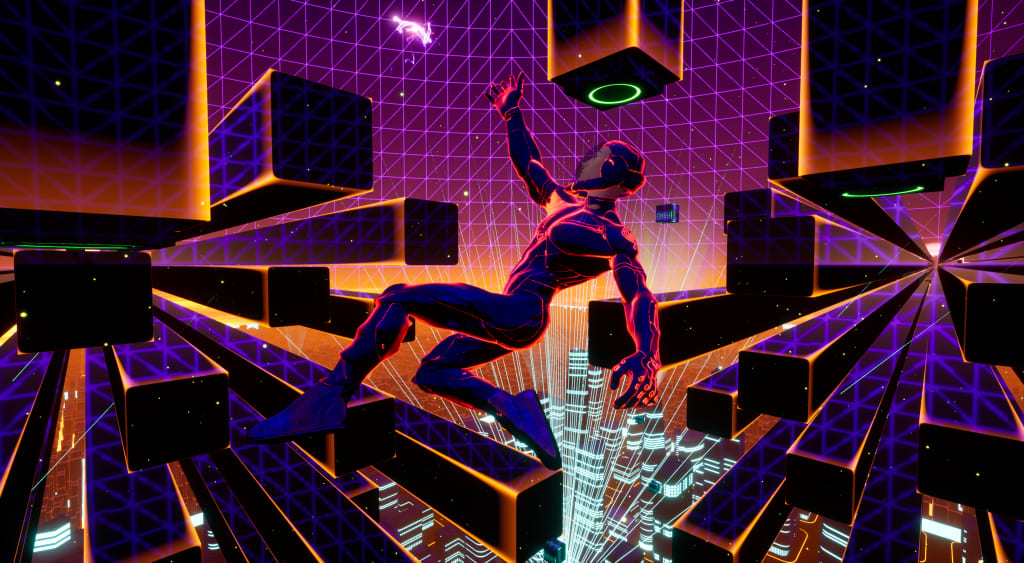The VR music platform Soundscape is collaborating with the electronic music producer deadmau5 to offer unlimited streams of his VR performance in the company’s musical metaverse.
The collaboration with deadmau5 will feature an exclusive virtual concert. The concert will be roughly an hour long and will be available in “Twilight Thicket,” one of the platform’s six universes.
The first major VR experience built natively on Unreal Engine 5, Soundscape is available on Steam and compatible with PCs and most VR headsets. It also boasts an audiovisual engine that enhances the aesthetics and responsiveness of visual elements across its many hyper-immersive worlds.
Despite a 24% drop in VR headset sales suggesting low enthusiasm for this pandemic-era style of entertainment, Soundscape chief operating officer Ben Ferguson is convinced that VR concerts are still in their infancy. “The musical metaverse won’t fully be enjoyed until 2030,” he says.
Interest in virtual concerts preceded the pandemic, with more than 10 million Fornite players logging on to watch Marshello’s performance in 2019. But the closure of live music venues starting in 2020 accelerated the trend, with Travis Scott, Ariana Grande, and Justin Bieber amongst the many artists whose digital avatars appeared before fans in the metaverse.
Four years later, many artists still continue to embrace the musical metaverse, spanning a wide-range of genres; recent VR performers have included Doja Cat, Jack Harlow, BlackPink, and even the Mahler Chamber Orchestra.
Unique vantage points
In VR, every seat is unobstructed, guaranteeing a perfect view of the stage for even those who are vertically challenged. Fans can even experience the show from vantage points that would be impossible at a physical venue: they can go behind-the-scenes, or even experience the performance from the perspective of being on-stage.
“Without disruptive crowds, we can focus on the pure experience between the artist and the user.” Ferguson says.
The metaverse allows for fantastical, digitally created environments that transcend the limitations of physical venues: something that Ferguson calls “conscious tech art.” His Soundscape demo features a universe where users’ avatars can dance to the music, and have the option to shoot fireballs and psychedelic lights from their hands.
Soundscape, which was founded in 2017 and is based in Colorado, deviates from the standard practice of producing VR concerts as a live experience, instead opting for an all-access, unlimited streaming model at the price tag of $39.99. This gives users expanded access, and to analyze the music in more depth. Yet the psychological experience of attending a live event—even if virtual—cannot be underestimated. Without social connectedness as an attendance motivator, users may not be as engaged in the experience.
Additional revenue streams for artists
Despite mixed engagement, VR concerts remain an attractive revenue stream for artists in an era where streaming services pay fractions of a penny per stream.
“Most people are surprised to learn that streaming services like Spotify only pay out around .00318 cents per stream. That means that it takes roughly 315,000 listens to that track to generate $1,000,” Ferguson says. “That’s a staggering amount of listens for one track to generate any kind of meaningful revenue. Soundscape is not a distribution platform for albums, like say, Spotify or Apple Music.”
While Ferguson did not comment on the structure of Soundscape’s agreements with artists, he stresses that “through extensive collaboration, licensing, and partnerships, there is ample opportunity to generate revenue.”
“There are no promoters to pay, no ticket fees, no commission splits, no venue fees,” he says. “We have eliminated the majority of the expenses related to a live show by eliminating the middleman and putting that money back into the pockets of the artists.”

Live, in-person concerts remain the greatest revenue stream for artists, but high concert fees and the contraction of the ticketing market means that artists are increasingly looking for other ways to sustain their work. While VR concerts don’t replace physical ticket sales, they open up new revenue opportunities through virtual ticket sales, sponsorships, and digital merchandise like NFTs. VR concerts can act as a promotional tool for artists, allowing them to build hype and connect with fans ahead of an upcoming tour. The immersive nature creates buzz and can drive demand for the in-person concert experience.
Recent technological developments have made platforms like Soundscape more attractive. “Two years ago, we introduced technology to allow regular PC users to jump into the world and have the same experience as VR headsets,” Ferguson says.
Jelentkezéshez jelentkezzen be
EGYÉB POSTS Ebben a csoportban

A fintech company called Slash offers business banking accounts tailored to the needs of specific kinds of entrepreneurs.
Slash provides business che

On April 14, 2025, Blue Origin launched six women—Aisha Bowe, Amanda Nguyễn, Gayle Ki

Google is rapidly expanding its AI search capabilities, as reflected in the announcements it made Tuesday at its Google I/O developer conference. The search giant announced the general availabilit

A humanoid robotics startup co-founded by prominent artificial-intelligence futurist Ray Kurzweil said on Tuesday that ven

The companies behind AI models are keen to share granular data about their performance on benchmarks that demonstrate how well they operate. What they are less eager to disclose is information abo

Twenty-four-hour customer support with zero hold time, infinite personalization, customized care, and behavior-based response are all aspects of the customer experience that will be expected soone

